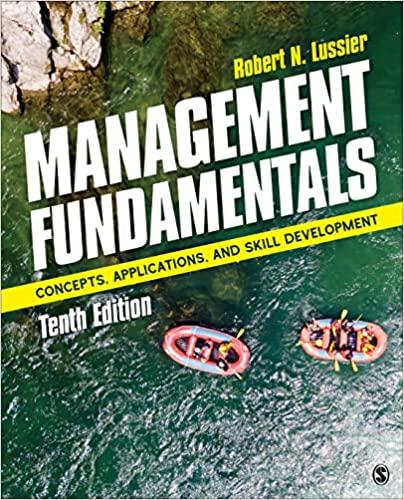Answered step by step
Verified Expert Solution
Question
1 Approved Answer
Module 1 Defineorganizational behavior(OB). Levels at which we study OB Emotional intelligence The research foundations of OB What is management? What is a manager? Managerial
Module 1
- Defineorganizational behavior(OB).
- Levels at which we study OB
- Emotional intelligence
- The research foundations of OB
- What is management? What is a manager? Managerial roles and duties.
- What are the functions of management?
- What are the three major categories of managerial roles?
- List the three essential managerial skills.
- Who is the father of scientific management?
- What is a bureaucratic organization?
- Draw Maslows hierarchy.
- Explain McGregors theory X and Y.
- What is the contingency approach of management?
- Be able to describe the major organizational theories (taxonomies) and lessons learned.
- List the three levels of management and know their major responsibilities.
- List the six major challenges managers face in the 21st-century work environment.
- Defineknowledge worker,intellectual capital, etc.
- What is an organization?
- When is an organization an open system?
- Identify the major stakeholders of an organization you are familiar with and describe how that manager can create value for each of these stakeholder groups.
- Why is the study of historical management theory important for todays business environment?
- What is corporate social responsibility? In your opinion should businesses be socially responsible? Support your opinion with reasons.
- Organizations as open systems.
Module 2
- What is competitive advantage and how is it related to a core competence?
- Factors that operate in an organization's general environment
- Factors that operate in an organization's specific environment
- Diversity: Valuing diversity is different from managing diversity.
- Affirmative action
- Difference between prejudice and discrimination
- Glass ceiling
- Customer relationship management and supply chain management
- Continuous improvement and TQM
- Information technology and decision making
- Knowledge management and learning organizations
- The planning process
- Types of plans
- Benefits of planning
- Planning tools and techniques
- Management by Objectives (MBO)
- Planning and decision making: decision-making model and inherent assumptions
- Types of decision: programmed and nonprogrammed
- Performance gaps, opportunities, and deficiencies
- Types of decision environments
- Problem-solving styles
- Classical and behavioral models
- Individual vs. group decision making
- The importance and benefits of planning
Step by Step Solution
There are 3 Steps involved in it
Step: 1

Get Instant Access to Expert-Tailored Solutions
See step-by-step solutions with expert insights and AI powered tools for academic success
Step: 2

Step: 3

Ace Your Homework with AI
Get the answers you need in no time with our AI-driven, step-by-step assistance
Get Started


